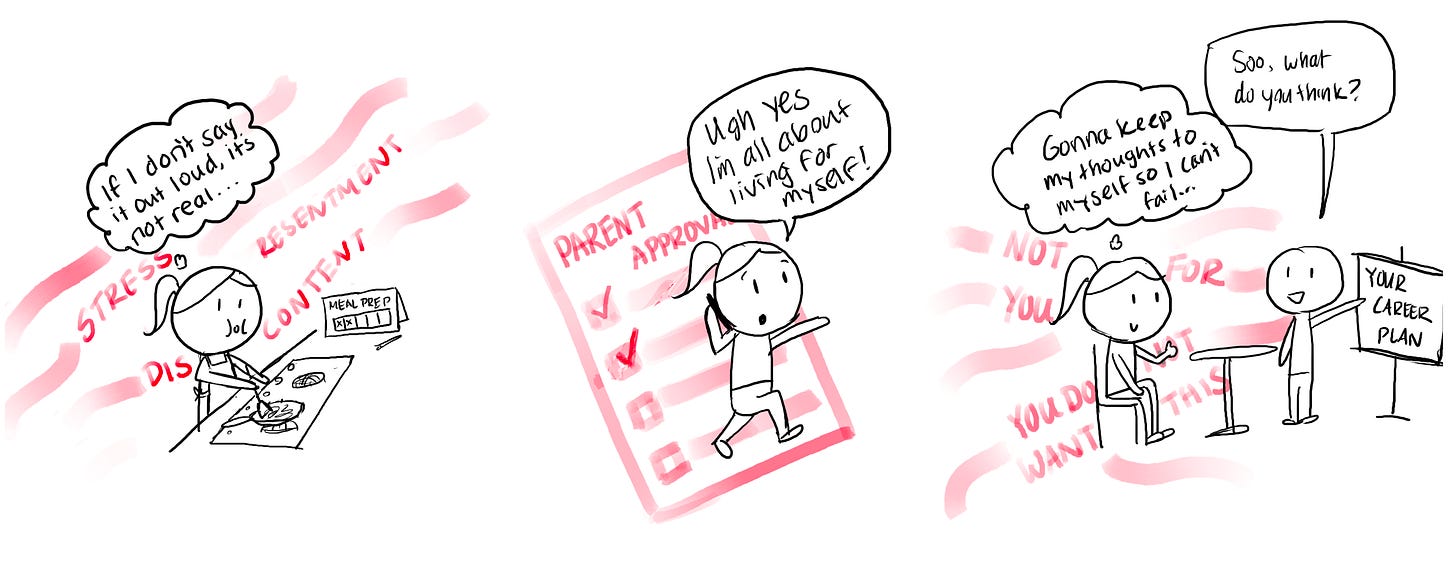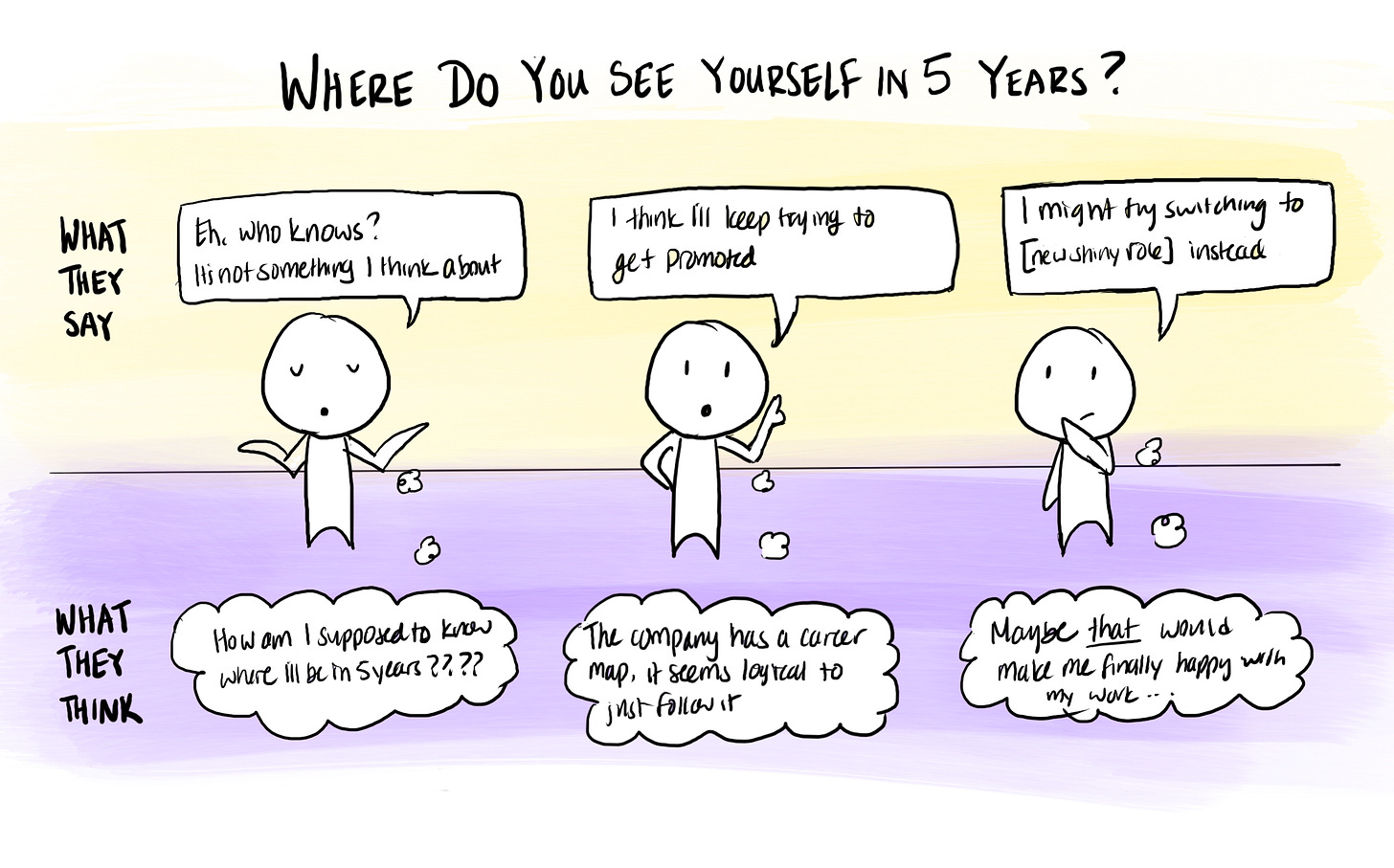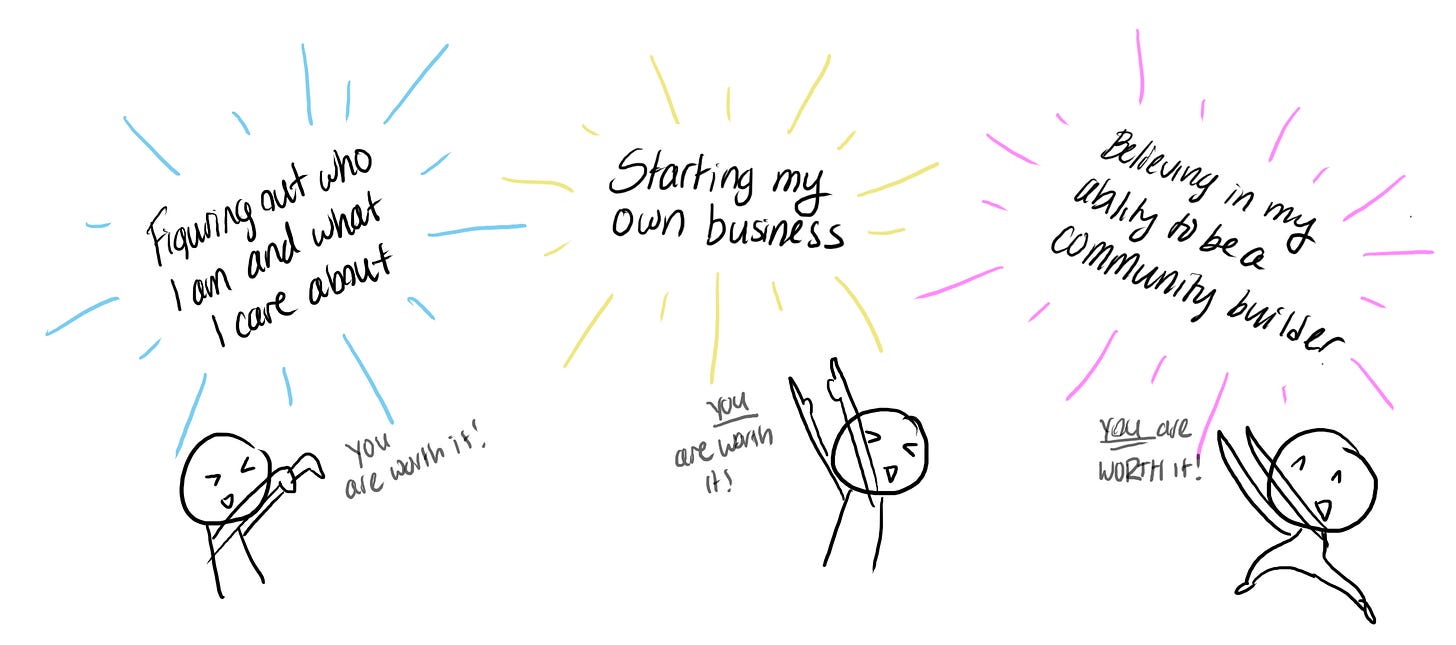What is career coaching anyways?
A deep dive into what it is, how it works, and what I think makes it so great.
Ever since I started career coaching, I’ve found that people don’t always know what it is.
And I’m not surprised. There are all sorts of folks that use the label “coach”. There are sports coaches who teach you specific drills and plays, executive coaches who serve the top echelon of company leaders, and hokey life coaches who promise to bring you on a spiritual journey that will solve all of your life problems.
So what is a “career coach”? Is it just working on resumes, interviews, and negotiations? What is it actually for?
I want to share with you what career coaching actually is, and why I think it’s so great.
What’s the point of career coaching
The goal of career coaching is to help you get to where you want to be faster.
The truth is, no one needs a coach.
There are plenty of ways to move your career goals forward on your own. You can self-reflect. You can read books, talk to friends, or take courses. You can join a Slack community for product managers or leaders to learn and network.
You don’t need a coach, but doing it yourself takes time, focus, and a LOT of self-discipline.
Career coaching can make the whole thing easier — and a lot more fun.
Because when you work with a coach, you gain a partner who will walk the entire road with you and is willing to call you out on your shit. They can give you that objective 3rd party perspective. They can give you the space to zoom out and figure out where you actually want to go and what is actually in your way.
How the coaching I love works
The best way to understand coaching is to sit down and experience the thing yourself. But since you’re already here, let me give you a taste of what the coaching style I like feels like.
1) We get clear on your vision — and make it one you really want
Coaching works best when we first establish a clear vision that you REALLY want to make happen. Which can be tricky because most of us have never done this before!
If someone were to ask you “Where do you see yourself in 5 years?”, how would you respond?
Most people have some sort of default response to this question.
And for good reason.
Maybe you have a dream, but you’re scared to say it out loud — in case you never get there.
Maybe it feels unrealistic to think that far. You can barely think 6 months into the future, nevertheless five years.
With so much going on in our lives — work, family, relationships, hobbies, the general state of the world — it’s no wonder few of us spend time seriously considering this question.
But, what if I gave you that time right now?
.
.
Forget about your current job/role/promotion ladder.
In 2-3 words, when you imagine yourself in a career in 5 years, how do you want to feel?
.
.
And how would you feel if you never were able to feel that way?
Together, we will figure out what you want to move towards and why it’s so important to you. We will uncover your career vision and your inner compass. Once we know those, making decisions will become so much easier.
2) We cut to the root through powerful questions and observations
A lot of people come into career coaching seeking tactical help, whether that’s improving their resume, honing their interview style, upleveling their management style, or making more strategic team decisions.
And while we do work on the tactical stuff, to make real, sustainable progress requires going a level deeper. Because all of those day to day decisions are governed by internal thought patterns that we run without question.

We ignore uncomfy feelings. We intellectualize our thoughts. We tell ourselves we are a certain way and that we should force ourselves do certain things.
Because even if our current way of operating isn’t ideal, at least it’s known. And the known feels safe.
Coaching shakes you out of the known through powerful questions. Questions like:
You know what next step you should do — so what’s holding you back?
What do you actually want?
The questions sound simple, but their effect is anything but.
They challenge you to look yourself in the eye and get honest.
Really, what is it you want? And what is holding you back from it?
As you begin to speak out loud, buried thoughts and feelings come to the surface.
You start noticing when you say one thing but act another way.
Things start clicking.
With the help of a coach’s questions and observations, you become aware of your walls, your rationalizations, and your assumptions — and you start to discover what’s at your core.
3) Rather than avoiding or judging your blockers, we get curious.
When people come face to face with a blocker, they generally react in a few different ways:
But these ways of thinking don’t give you longterm fixes. You’re either accepting defeat, judging yourself, or trying to grind through it (and will likely burn out from trying).
Instead of jumping to a solution, what if you asked yourself why those blockers are in your life in the first place?
What beliefs do they stem from?
When did those form?
How have those beliefs held you back in life?
But also - how have they helped you?
Each belief has a story. And the story is never black and white.
Taking time to understand the role your blockers have played in your life can make such a big difference because it’s only after that we can decide if we want to change our relationship with it.
4) You design an action that helps you move forward — regardless of if you succeed or fail at it.
In coaching, you don’t just talk about the past and present, you also design and commit to actions that help you move forward.
The point of these actions isn’t to forcibly push you forward, but rather to figure out what will get you unstuck. A lot of times, we design actions that help us test our long-held beliefs/assumptions.
You may decide to challenge your anxiety-based decision making by setting aside 2 hours a week where you do something out of excitement rather than fear.
You might test your resistance to asking for help at work by asking a trusted coworker for assistance and seeing what happens.
For each action, it’s not actually about whether you succeed or fail at it. What’s more important is seeing what you notice about yourself as you go through it.
Coaching is a commitment
Most people have dreams, but they’re afraid to pull them from the back of their minds and say them out loud. They’re wary of ridicule. Failure. They’re afraid that the timing isn't right.
But is the timing every truly right?
What if you instead said to yourself, “Hey, this shit is important and I want to work on it”?
What if you said, “Yes, this is gonna cost both time and money, but my dream is worth the investment”?
Coaching is a container that gives your dreams room to breathe.
Working towards those big, ambitious dreams — it’s not easy. It takes time. Sometimes 6-12 months of time. Sometimes more.
Getting there requires deep mindset shifts and bold experimentation. It takes working through limiting beliefs you’ve had your whole life, learning to make mindset shifts that actually last, and moving forward in a way that doesn’t burn you out.
I’ll admit — this shit’s hard.
It’s up to you to decide if your dreams are worth it.
Learning to invest in myself
I’ll be honest— making the commitment to getting coaching was tough for me.
I had never been the type of person to pay for specialized services that improve my life. It’s just not how I was raised. Toilet broken? I’ll watch some youtube videos. Want to pivot to product management? I’ll learn from books and reach out to my network. The only reason I tried coaching for the first time was because it was given to me at such a low price point that it was practically free.
Even after I became a coach, I tried to hack together free coaching for myself by setting up coaching swaps, talking to friends, reading books, and doing self-reflection. Surely I as a coach didn’t need to pay someone else to coach me.
Ironically, it was in a coaching session that I really had to wrestle with this mental block.
I had been feeling pretty anxious with my coaching business, wondering how in the world I could ever make this financially work, when I decided to try out financial coaching. But when it came to talking about pricing, I once again got stuck.
But that’s when we dug deeper. We started exploring where that feeling came from, and I realized it came from my family. I would see my parents do everything themselves. We lived with the belief that if you can do it yourself, why pay for it? Money was scarce. But time — time was cheap. Time was infinite.
But…was that true? I didn’t have forever to figure this business out. What if I spent some time and money to work through my mental blocks? If I could shift my mindset, how much more progress might I make ? How much time might I save? How much faster might I get to building a sustainable business?
Maybe my time was worth something.
In that moment, I took the leap to pay for my own coaching.
It was big.
It was me saying — hey, I believe in you. Hey, you are worth the investment.
And it was me then seeing post-payment — woah, I spent the money and I’m still alive.
I originally thought that I would give myself 3 months to test the validity of this business. But when September rolled around, quitting wasn’t even on the table. Because of the coaching I got, I had no doubts in pursuing my vision.
I’m still not great at spending money on myself. That “do-it-yourself” programming runs deep. But I’m taking one step at a time to believe that my dreams are worth the investment — that I am worth the investment.
Interested in taking the leap? I offer free 90 minute coaching consultations to folks that want more from their careers. I’d truly love to help you find more clarity and momentum and figure out what’s the next best step for you - even if that isn’t coaching with me :)
—
FAQ
There are some common questions I get about career coaching that I’ll answer here.
How is career coaching different from the career development I get at my work?
Maybe your manager is really good at career development and gives you time in your 1:1s to strategize together.
That’s great! You’re one of the lucky ones to have a manager with the capacity and skillset to do that.
However, the career work you are doing is still in the context of that company. It’s centered around the opportunities at your company, and at most in your field.
Coaching helps you identify that larger scale vision you want for your career and how it fits into the rest of your life. It goes deeper.
How is career coaching different from therapy?
Therapy is all about helping you process how you are in the present by looking into your past. Coaching is about helping you get somewhere in the future by processing the present. Coaching is more focused towards a singular goal. We translate the deep work we do into actions that keep you moving towards your goal.
The two actually work really well hand in hand.
I’m always happy to answer any other questions as they come up! Thanks for reading :)











